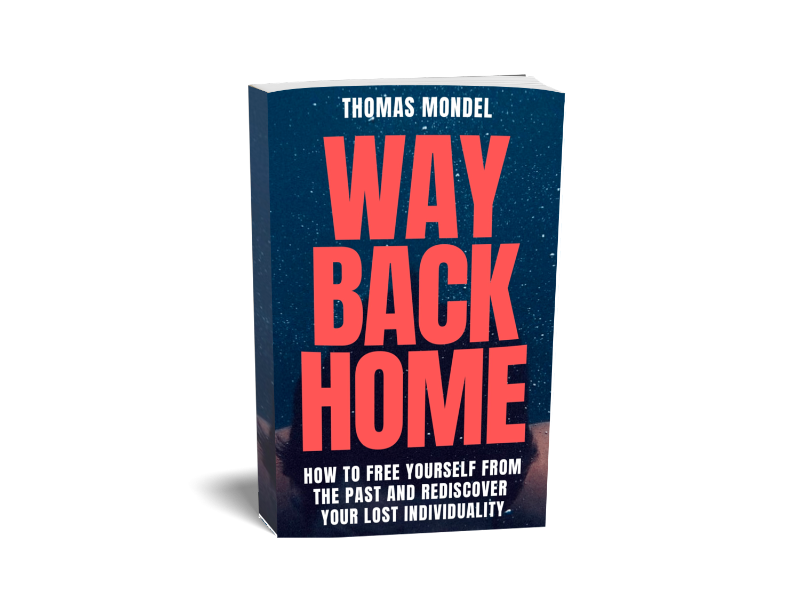No one ever stayed true to himself without first shouting a big “SCREW YOU” out into the world. That’s what allows us to discover our true individuality.
Or better said, create it.
For years, I kept telling myself that I wanted to become a full-time writer. But then my actions rarely reflected this ambitious dream. And so I thought a lot about what was holding me back.
Did I not want it? Could it be that I was deluding myself and I just liked the way the whole “being a writer” thing sounded or made me feel? Or could it be that the real reason why I was not following through is that I wanted something completely different a tiny bit more?
There is a good chance that I wanted to be “happy” and move toward what might be good for me. But it could also be the case that I sought to avoid making others “unhappy” a tiny bit more.
What else could explain the sudden guilt and self-doubt arising from within whenever I started to get ahead in my life for once? Why did I value the approval of people around me more than my own desire to move toward a place in which I already knew I’d be better off for myself? And who are these other voices that they had such a significant influence on me and the way I navigated my life?
There are these opposing forces within me that continuously clash into each other and then fight for their survival. On the one side, I have this gut feeling that points me toward what might be good for me. And on the other side, there are all these other voices, which seem to tell me how I’m supposed to behave instead.
Oftentimes, we don’t even realize when we are caught up in old and limiting beliefs. We don’t recognize it when we are bound to a no longer useful model of how we assume the world works. And so it happens that the idea of what we think is acceptable, and what we think is not, starts to dictate our entire life.
But this also raises the question of where this idea initially even came from? It makes sense to assume that it had to arise from somewhere in my past since it now impacts my present.
It makes sense to assume that my urge to seek the approval of others served me at some point in my past. Like when I was still a child and depended on the support and care of my parents.
Back then, “to do what I was told” was of great importance for both my well-being and maybe even my survival. But, now as an adult, the very same behavior does nothing but hinder me from experiencing what I truly want – and maybe even desperately need.
When we first enter this world, our parents offer us an initial “blueprint” of how life works. We then start to challenge this model. We ditch what we find useless, and tightly hold onto what we find beneficial instead. In the best case, our parents encourage us to trust our own judgment over the opinion of anybody else. And in a perfect world, they also prepare us to walk our chosen path with assertiveness and pride.
Under normal conditions, we grow out of these childish tendencies “to obey” with patience and time. We learn to autocorrect faulty, wrong, or no longer useful behavior as we continue to interact with the world and see how people around us react to our decisions and actions.
But life is not known for “normal conditions.” Usually, a lot of abnormal and random things tend to happen, which then alter the direction we initially set out in.
For me, the sudden disappearance of my father after my parent’s divorce was the moment that pushed me off my personal edge and destabilized my inner world. Suddenly, my safe world collapsed, and also with it the belief systems I held onto crumbled into pieces.
So, how was I supposed to deal with such an extreme situation as a child? How do you rationalize that the father you loved – and you thought loved you too – suddenly doesn’t want to see you anymore? And what if – after endless hours of trying to make any sense out of this overwhelming situation – you conclude that it must have been YOUR FAULT all along.
In my most vulnerable times, in which I needed the guidance of a loving and caring father the most, I was left alone with my thoughts. And so, I came up with weird justifications on why everything that happened also had to happen and was totally justified, as I clearly deserved it as punishment for my misbehavior and imperfections.
The supportive environment I grew up in was lost in an instant, and self-doubt, trust issues, and an overwhelming load of guilt took its place instead.
I started to put the blame on myself, and soon a new belief system arose from within. A belief system that made me think that I hadn’t been good enough for my father, and nor for the world, and I probably never would, and that’s also why he left me, and why everyone else would do so sooner or later as well.
In some sense, it could be that I am now still holding onto the idea of the “judging father” whose approval I deem crucial for my own survival and well-being. And it could be that I didn’t grow out of these grandiose expectations I’d set up for myself, only to measure my self-worth against them.
What if I became a grown-up child who loves and maybe even envies the idea of the superior parent who always knows what to do next?
Freud said that one does not become a man until his father has died. But Jung said that this death could take place symbolically. Until then, the young child stands in awe in front of the father who – compared to himself – always seems to know the way. The grown adult, however, who has already faced their fair share of hardship and struggle in the world, realizes that everybody, even the glorified father, is just as clueless on where to go next as the rest of us.
Everybody is stumbling and falling through life and trying to make it work as best as they can. We stumble and fall, and then get back up and try again. And, ideally, the next time we aim to get it at least a tiny bit “more right.”
But the question is: “Make it right for whom?”
I began to wonder, although my past is long gone, why am I somehow still in the grip of it and seem unable to catch up with reality instead?
Could it be that, even though living up to other people’s expectations gave me some form of security in the past, now as an adult, the same behavior instead suffocates my emotional needs and restricts my ability to move independently through the world? And what if I somehow still cling to this outdated and suffocating behavior, nonetheless, as I haven’t learned a better way to get all these conflicting impulses within me under proper control?
However, it’s close to impossible to overcome these guilt feelings with rational thought since they have their beginnings in a long-forgotten past from which they also derive their emotional intensity and power. Introduced by some critical moments in my past, but intensified through the many years of suppression and delusion that came after, they now still rule over my life without my conscious awareness.
So, what if I merely learned the wrong lessons from these early memories, and, as a result, made my world a much darker place than it might have needed to be?
When you are in pain, and you also feel powerless about your whole situation, all you long for is to get at least some form of control and power back. And when someone who is supposed to love you puts you down, you might unconsciously start to self-harm and self-sabotage, so that you can beat them to it. It’s like I was inflicting the pain on myself voluntarily so that no one else could do so unexpectedly. It gave me a false sense of the precise control that I so desperately tried to regain. And it’s built on the idea that suffering is inevitable anyway, and it’s therefore best to at least be in control of when the next piece of chaos hits you.
And so, I became a master at reading other people’s current emotional state. A man who happily sacrificed his own well-being, so he could transform into whatever someone else might have expected of him at any given moment instead. A trickster who found joy in toying with others, so he could finally feel powerful and in control, unlike the lost and overwhelmed boy he used to be. I became a manipulator. A puppet master who tied strings on the people around him and then made them dance to his will. A deceptive man who suppressed and then slowly forgot about his own desires and needs, so he could better focus on those of everyone else around him.
Until ultimately, the voice within, that used to guide me toward the things I wanted and needed, grew more and more silent until it eventually died off entirely.
It sucks that most often we don’t even realize it when we are still controlled by our past. And it sucks that all this outdated conditioning then keeps us in the same nasty place we so desperately try to escape.
But the worst and most saddening part is that these chains were often put on us by our closest friends, family, and sometimes even ourselves.
And so, even years later, I found myself in a weird spot in which no accomplishment was ever good enough and no success could ever fill the emptiness I felt within. I continued to rush from one superficial goal to another, in hopes of getting the next high of “feeling OK with myself for once.”
I chased material things to coat my insecurities and past pain, and I missed out on the endless and abundant opportunities life had to offer instead. All the great things that happened, and still happen, passed by me unnoticed, as they couldn’t satisfy the cravings for what I needed so desperately back then as a child.
Well, at least until I finally allowed myself to say, “SCREW IT!” and let the old story die, so I could instead confront the past, and with it, its truth.
My truth.




